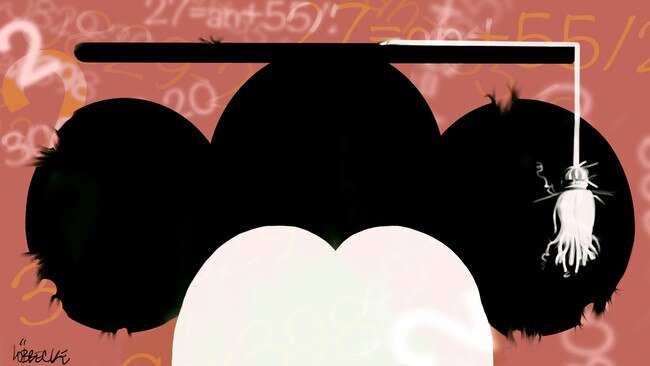
It is time for the tertiary education system to step up and meet its obligation to help young people make informed choices.
As Australia’s Chief Scientist, I have long advocated the need for a common set of advice to school students about the importance of studying core subjects. This would help them sort through the maze of subject offerings and choose subjects that give them the right grounding for university, the workforce or vocational education.
This is about deep learning, specialisation and a culture of high expectations.
Unfortunately, the Australian Tertiary Admission Ranking has come to dominate years 11 and 12 to the extent that students are motivated to game the system, avoiding what they perceive to be difficult subjects as they try to maximise their ranking. This is self-defeating for both universities and students.
At the same time, universities have shifted away from prerequisites for entry to many courses, further confusing the signals for school students about the subjects they should be taking.
My office and the Australian Mathematical Sciences Institute analysed the mathematics and science entry requirements in 2020 for 1587 undergraduate university courses across Australia’s 40 universities. We looked at the disciplines of architecture, computer science, economics and commerce, education, engineering, health and medical sciences, and science — the programs with strong links to the fields of mathematics and science. Engineering topped the university disciplines in terms of the number of courses that required first-year students to have studied some mathematics in Year 12. However, even for engineering, 38 per cent of courses in Australian universities required no mathematics at all.
Other disciplines had much lower mathematics requirements. Of the 56 architecture courses offered by 26 universities this year, only seven required any mathematics, despite the close relationship between architecture and mathematics and the importance of geometry in architectural design.
Year 11 and 12 students who study mathematics have three options: basic, intermediate or higher mathematics. Our analysis found only 19 of the 1587 courses required higher mathematics.
Science prerequisites featured particularly sparsely on the list of university requirements. Universities offered 385 science courses this year, including biology, physics, biotechnology, aviation, environmental science, veterinary sciences, genetics, geology and psychological sciences. It is striking that only 15 per cent of them required any science at senior secondary school.
It is important to point out that instead of requiring a subject as a prerequisite, some universities recommend or expect a level of proficiency, often signalled to students through “assumed knowledge” entry expectations. But an expectation and a requirement are not the same.
Our findings do not mean students are entering courses without having studied science or mathematics in Year 12; just that they can. If they do, the reality is they are less likely to succeed.
Let me be clear that I am not advocating a return to prerequisites, given the valid and important reasons for flexibility in entry requirements. What I am advocating is that universities develop a clear and common set of advice to students about fundamental subjects – English, maths, science, languages and history – that will set them up best for success at university and through their lives. The signals around these subjects should be strengthened so students can make informed choices.
There are good signs this is happening already. This need for realignment around core subjects is recognised in the NSW curriculum review. The review, released in June, emphasises depth of content, rather than breadth, reining in the curriculum to prioritise core facts, concepts and principles. It highlights the crucial importance of strong foundations in the early years at school, with special attention on reading and mathematics, ensuring that in the middle years students meet clear standards.
Changing the signals universities send to school students will support this reshaping of the curriculum, influencing student choices not only in those final years of school, but also how subjects are taught in earlier years.
Universities are facing unprecedented challenges in the face of the pandemic. What better time to consider and improve the signals they send to Year 12 students looking for a smooth path into tertiary studies? As universities reshape themselves, it is my hope that the ATAR will play a lesser role and a new emphasis will be placed on deep learning of fundamental subjects, with clear signals provided to schools and students about where their efforts should be focused, allowing them to make informed choices.
Alan Finkel is Australia’s Chief Scientist. Read the Informed Choices position paper.




The final years of school can be confusing and stressful at the best of times. We do young people no favours when we contribute to the confusion by failing to send clear signals about the subjects and the pathways that will set them up for success.